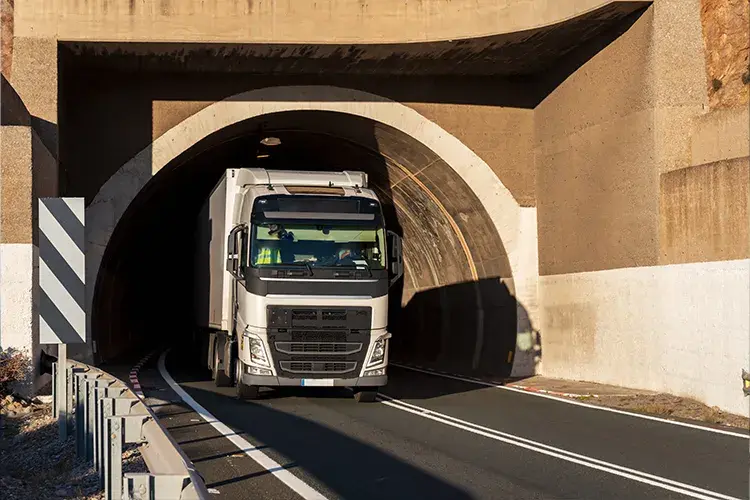The truck toll in Germany applies to all motorways and federal roads and to vehicles with a total permissible weight of more than 3.5 tonnes. On this page you will find important information about the mandatory toll, calculation of charges, exceptions and toll routes. You will also receive up-to-date information on the CO₂-dependent toll and the applicable legal requirements for freight transport in Germany.
Tolls in Germany

-
Mandatory toll for commercial vehicles over 3.5 tonnes
-
No mandatory toll for cars, buses and caravans
-
Tradesmen’s exception (Tradesmen’s vehicles are exempt from the mandatory toll under certain conditions)

General information
Toll provider: Toll Collect
The toll in Germany is a central component of transport infrastructure financing and mainly affects heavy-duty transport. Since the truck toll was introduced in 2005, a significant portion of the costs for the construction, operation and maintenance of motorways and federal roads have been covered by toll fees.
Since 1 July 2024, vehicles with a technically permissible total weight (tzGm) of more than 3.5 tonnes have had to pay tolls. The mandatory toll only applies to vehicles used for freight transport or so intended. Vehicle combinations are only subject to the toll if the towing vehicle weighs more than 3.5 tonnes.
There is currently no general mandatory toll for cars and camper vans. However, a possible car toll has been discussed – in particular, for foreign vehicles.
 Vehicles subject to tolls
Vehicles subject to tolls
In Germany, a comprehensive mandatory toll applies for heavy goods vehicles. All vehicles over 3.5 tonnes tzGm (technically permissible total weight) must pay route-dependent toll fees to the operator Toll Collect for the use of motorways and federal roads.
The fees apply on all motorways, including fuel stations and rest facilities, as well as on all federal roads, even within closed villages.
| Valid for vehicles | Route | Payment options |
| HGV > 3.5 tonnes | all motorways and federal roads | UTA One® next toll box; Toll Collect OBU toll box; route ticket (payment possible via UTA Card) |
| HGV > 3.5 tonnes | Warnow Tunnel, Herren Tunnel | UTA One® next toll box; Toll Collect OBU toll box; route ticket (payment possible via UTA Card) |
What should I do if the truck toll was not paid?
.svg) Truck toll – CO2-dependent toll for commercial vehicles
Truck toll – CO2-dependent toll for commercial vehicles
In Germany, the truck toll is charged on all motorways and federal roads. It serves to finance, maintain and expand transport infrastructure and at the same time contribute to more environmentally friendly logistics.
The toll system is based on satellite monitoring: with an on-board unit (OBU) or via digital route booking, routes travelled are automatically recorded and the corresponding fee is calculated. Data transmission is encrypted and controlled by the toll operator.
Vehicles over 3.5 tonnes subject to tolls
All vehicles and vehicle combinations over 3.5 tonnes tzGm (technically permissible total weight) intended for freight transport are subject to tolls. The toll is calculated on the basis of distance driven, technically permissible total weight (above 18 tonnes additionally of the number of axles), pollutant class and carbon emissions class of the vehicle. Since the introduction of CO₂ differentiation, the environmental factor has been taken into greater consideration – lower-emission vehicles benefit from lower tariffs.
Toll-exempt vehicles
Certain vehicles are exempted from tolls in Germany or are partially relieved. These include:
-
Emission-free vehicles such as electric cars, hydrogen combustion engines and fuel cell vehicles. They are completely exempt from tolls until the end of 2026.
- Trade vehicles: The Toll Exemption for Tradesmen’s Vehicles applies if the vehicles are driven by employees of a tradesman and transport materials, tools or handcrafted goods that are required for their own services. Transport of industrially manufactured goods, transport for third parties or mainly non-trade vehicles are not exempted. In the event of checks, proof such as trade cards, delivery notes or customer orders must be presented.
-
Other toll-free vehicles: These include rescue services, fire brigade, Federal Agency for Technical Relief, emergency response, agricultural and forestry vehicles, camping vehicles and vehicles used exclusively for passenger transport.
These exemptions ensure that low-emission, tradesmen’s and certain emergency vehicles are exempt from the mandatory toll. For more information on toll-free vehicles, please visit the Toll Collect website.
Carbon toll
With the introduction of the carbon toll, Germany is promoting climate protection in freight transport and emission-free technologies. This not only makes environmental costs more transparent, but also creates incentives to switch to more sustainable drive systems. You can learn more about the carbon toll here.
 Overview of toll routes
Overview of toll routes
The truck toll in Germany covers the entire motorway network and all federal roads. In addition, individual bridge and tunnel sections are subject to tolls. A map of the current route network is available on the Toll Collect website as a PDF download. More information about toll collect toll routes.
 Tunnel
Tunnel
At the tunnels listed below, the tunnel fees can be paid via the UTA Card and UTA One® next:

 Toll payment
Toll payment
Explore online booking
Even without customer registration, you can book the truck toll in Germany via the Toll Collect website and pay the toll charges with your UTA Card.
Processing via the app
Alternatively, you can use the Toll Collect app to book tolls in Germany quickly and easily via your smartphone or tablet. Payment is also convenient and secure with your UTA Card.
UTA billing is clear, transparent and matches the Toll Collect toll statement – so you always have an overview of your toll bookings.













